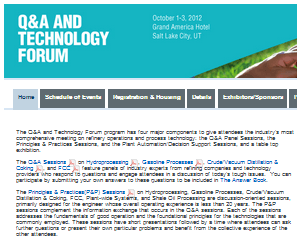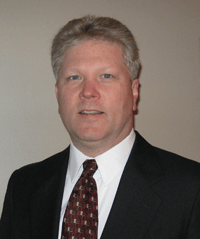 The American Fuel and Petrochemical Manufacturers (formerly NPRA) are holding a Q&A and Technology Forum October 1-3, in Salt Lake City, Utah. Emerson’s Tim Olsen, whom you may recall from earlier refinery-related posts, shared with me that several Emerson folks will be presenting at this forum. These include:
The American Fuel and Petrochemical Manufacturers (formerly NPRA) are holding a Q&A and Technology Forum October 1-3, in Salt Lake City, Utah. Emerson’s Tim Olsen, whom you may recall from earlier refinery-related posts, shared with me that several Emerson folks will be presenting at this forum. These include:
- The Economics Of Process Measurements by Doug White (Emerson)
- The New API RP 556 – Best Practices for Instrumentation, Control, and Protective Systems for Gas Fired Heaters by Randy Stier (Valero) and Gary Hawkins (Emerson)
- Remote Asset Monitoring & Diagnostics: An Expert Always On‐Line by Nikki Bishop and Aaron Crews ( both with Emerson)
- Security Systems in a Refinery Using Wireless Smart Transmitters by Sankar Roy (Samsung) and Dennis Huey (Emerson)
I asked Tim if I could get some sneak peeks of a few of the presentations to share with you. In Nikki and Aaron’s remote asset monitoring presentation, they highlight the scope of essential assets, describe the work of the University of Texas at Austin’s Separation Research Program—specifically their work in essential asset monitoring and remote monitoring. They successfully implemented essential asset monitoring strategies for pumps, heat exchangers and blowers.
They define essential assets in process manufacturing as any asset whose outage would cause a significant process disturbance, slowdown, or shutdown. Often these assets don’t have wired monitoring systems like the larger, more expensive equipment such as generators and turbine compressors. They include assets such as blowers/fans, pumps, heat exchangers, fired heaters, vessels, fin fans, simple compressors, cooling towers, and pipes.
Their presentation includes a demo of UT’s remote system monitoring showing how their remote monitoring system can be used to automatically route alerts to the right personnel at the onset of the condition, whether it be a cavitating pump or an overloaded PC.
Sankar and Dennis’ presentation highlights the overall wireless plant network topology including how it securely and seamlessly integrates wireless field instruments into plant infrastructure in a Houston refinery.
Gary will discuss the newly revised second edition (2011) of the American Petroleum Institute’s Recommended Practice, RP 556, is a collection of best practices for gas fired heater instrumentation, control and protective systems. The API committee worked on this document for several years resulting in a significantly updated revision to the prior document from 1997.
Tim also shared that the Emerson team will host a hospitality suite (Provence, Level 3) on Monday and Tuesday nights during the event. They will have tabletop 38 as well during lunch and opening reception. If you’ll be at this forum, make sure to connect with Tim, Doug, Gary, Nikki, Aaron, and Dennis.

